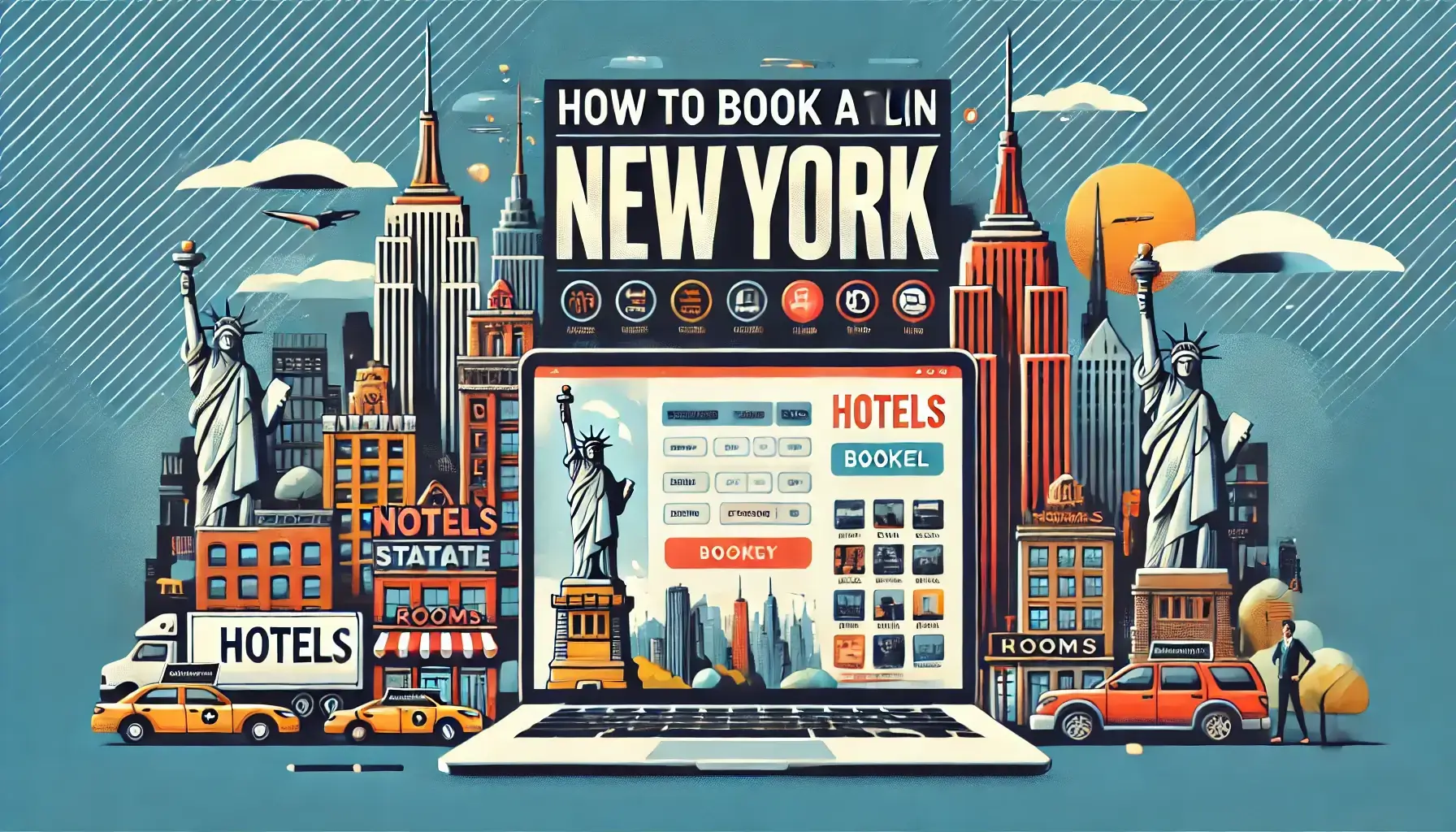
New York City, often called “The City That Never Sleeps,” offers a diverse range of accommodations, from luxury hotels to budget-friendly stays. However, finding the right hotel can be overwhelming with so many options available. Choosing the right place to stay is crucial for making your trip comfortable, convenient, and enjoyable. Whether you’re visiting for business, sightseeing, or a special occasion, a well-chosen hotel can set the tone for your entire trip.
Planning ahead is key to ensuring you get the best deals and options that fit your needs. By booking early and using the right tools, you can save both money and time while avoiding last-minute stress. In this guide, we’ll walk you through the essential steps to book the perfect hotel in New York.
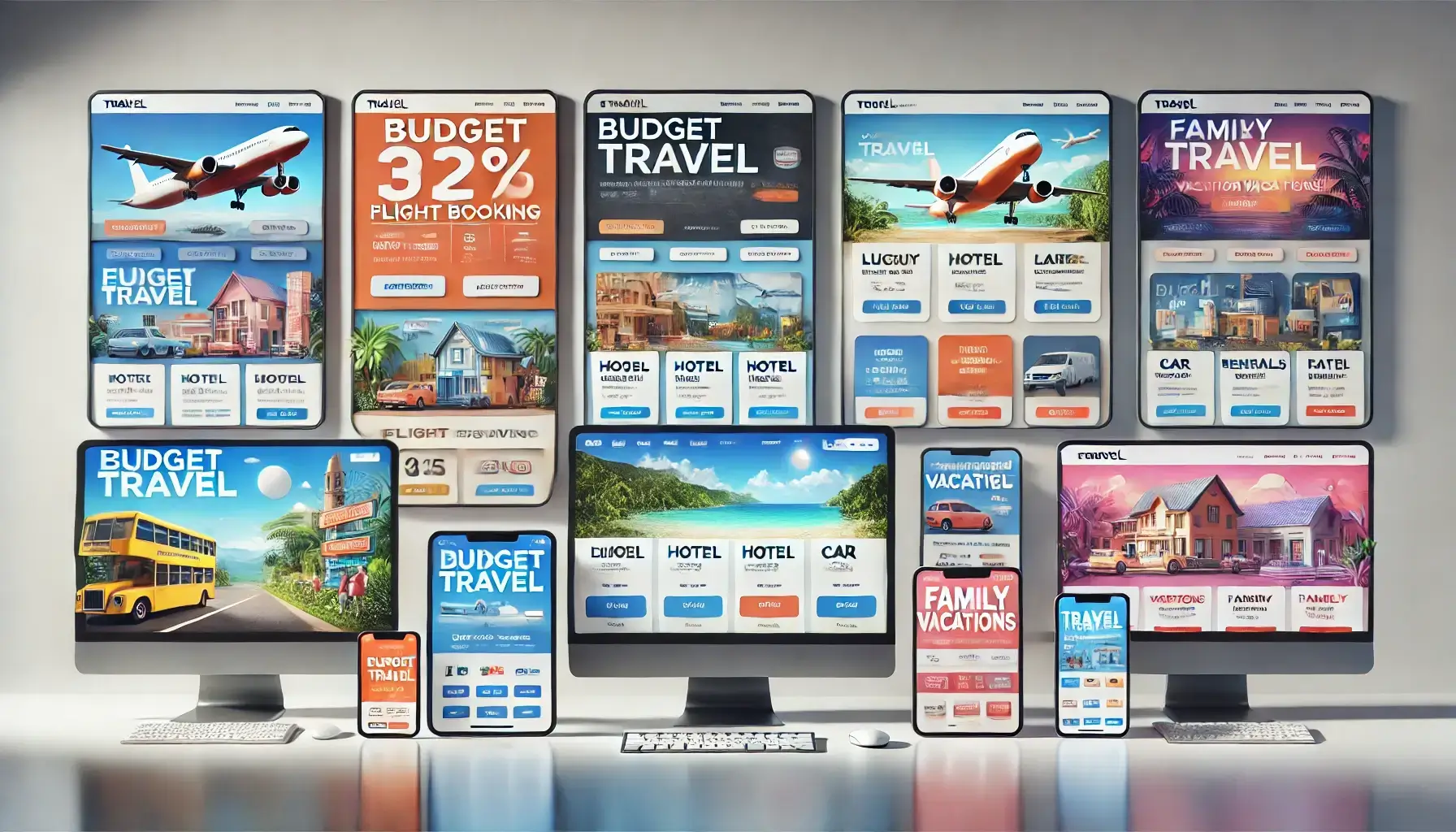
When it comes to booking a hotel in New York, the first step is research. Fortunately, there are plenty of hotel comparison websites that make this process easier. Popular platforms like “Skyscanner”, “Kayak”, “Trivago”, “Booking.com”, and “Expedia” allow you to search through hundreds of hotels at once, comparing prices across different providers. These platforms aggregate information from a variety of booking sites, so you can be sure you’re getting the best possible deal.
Not only do these websites offer price comparisons, but they also provide filters for amenities, location, and guest ratings, making it easy to tailor your search to your preferences. This means that whether you’re looking for a budget-friendly option in Brooklyn or a luxurious hotel in Manhattan, these platforms help you zero in on the right choice quickly and efficiently.
In addition to comparing prices, it’s crucial to read guest reviews. Reviews offer invaluable insights into the quality of service, cleanliness, and overall experience at a hotel. Pay special attention to recent reviews, as they reflect the hotel’s current condition and management practices.
Reviews from other travelers can alert you to potential red flags, such as hidden fees or ongoing renovations, and can also highlight positive aspects that might not be immediately apparent in a hotel’s description. By taking the time to read both positive and negative reviews, you’ll be able to make a more informed decision about where to stay.

When booking a hotel in New York, one of the most important decisions you’ll make is choosing the right neighborhood. The city is vast, and each area offers a different experience. If you’re visiting for sightseeing, staying in “Manhattan” is ideal, as it places you close to iconic attractions like Times Square, Central Park, and the Empire State Building. On the other hand, “Brooklyn” offers a more laid-back vibe with trendy restaurants, local shops, and beautiful parks, making it a great choice for those looking to experience a different side of the city. “Midtown” is perfect for business travelers, as it’s home to many corporate offices and transportation hubs, while “Lower Manhattan” or “SoHo” are excellent options for travelers interested in art, fashion, and culture.
Ultimately, your choice of location should align with your trip’s purpose, whether you’re there for business, leisure, or a mix of both.
Setting a budget before you start looking for hotels is essential. New York is notorious for having a wide range of hotel prices, from budget-friendly accommodations to high-end luxury suites. Decide how much you’re willing to spend per night and stick to it. Keep in mind that taxes and additional fees can significantly increase the overall cost, so factor these in when setting your budget.
It’s also worth noting that staying slightly outside the city center (e.g., in “Queens” or “New Jersey”) can offer cheaper rates while still providing easy access to Manhattan through public transportation.
When narrowing down your hotel choices, think about the amenities you can’t live without. For some travelers, “free Wi-Fi”, “breakfast”, or a “fitness center” are must-haves, while others might prioritize access to a “pool”, “spa”, or “pet-friendly” accommodations. Many hotels in New York cater to business travelers with in-room workspaces and conference facilities, while families might seek hotels that offer cribs, kid-friendly activities, or kitchenettes.
Make sure to filter your search based on the amenities that matter most to you, as this can save you time and ensure your stay is as comfortable as possible.
Your reason for visiting New York should also influence your hotel choice. “Business travelers” might prioritize proximity to office buildings or conference centers, as well as amenities like fast Wi-Fi or a quiet workspace. “Families” may look for larger rooms, on-site dining, or nearby attractions like the “America” and “Museum of Natural History”. For “couples” or those on romantic getaways, boutique hotels with a more intimate setting or a location near picturesque spots like “Central Park” might be ideal. Tailor your hotel choice to suit the specific needs of your trip to ensure a memorable experience.
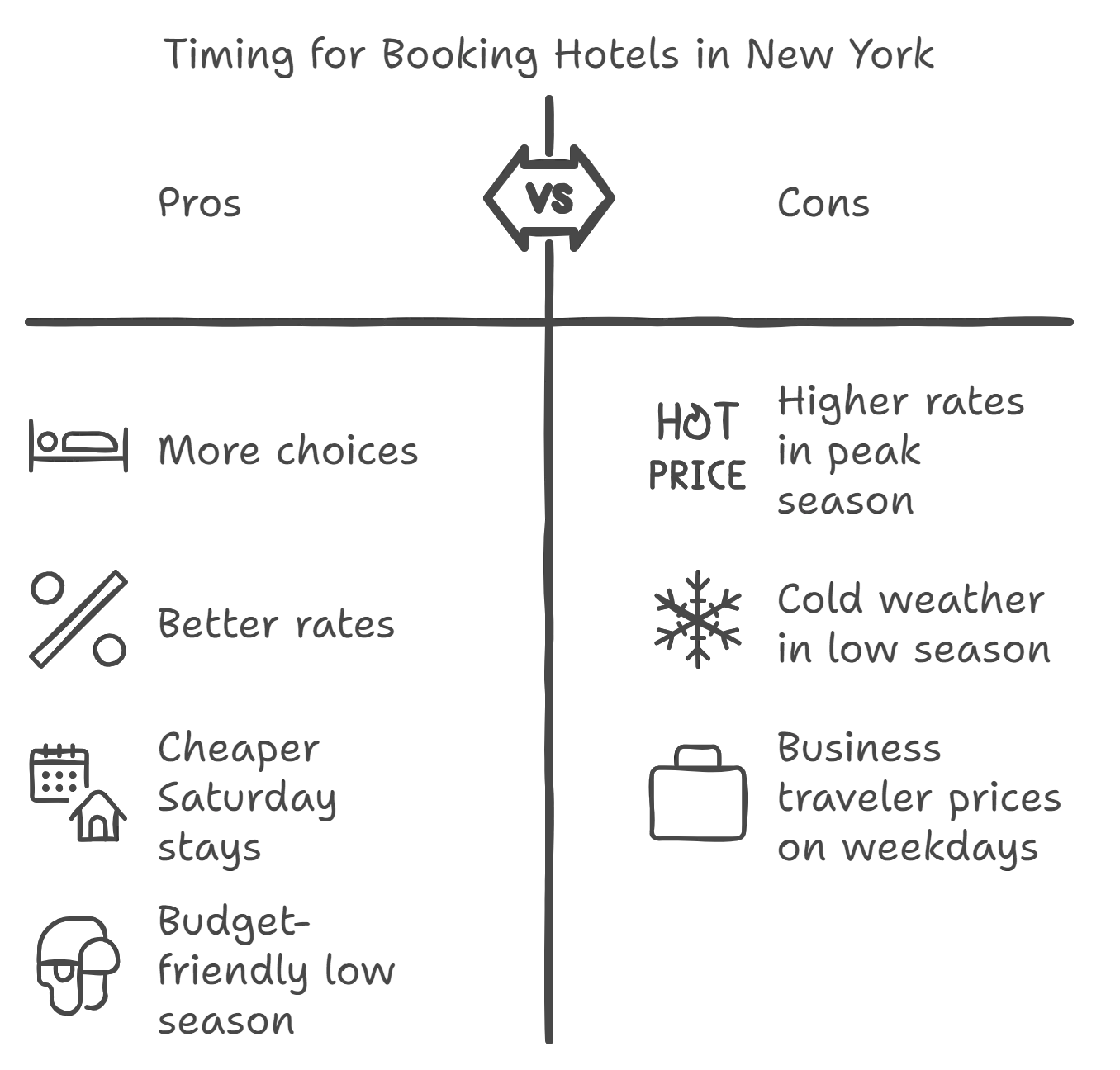
In New York, timing can make all the difference when it comes to getting a good deal on your hotel. It’s recommended to book at least “90 days in advance”, especially if you’re planning to visit during a busy time of year, such as the holidays or major events. Booking early not only gives you more choices, but it also increases your chances of securing better rates.
New York experiences high demand during peak seasons, particularly in summer and during the holiday season (November and December). If you’re looking to save money, consider visiting during the “low season” (January and February), when hotel rates are typically much lower. While the weather may be colder, it’s an excellent time for budget-conscious travelers who don’t mind bundling up.
Interestingly, the day you book your stay can also affect the price. In New York, “Saturday stays” are generally cheaper compared to weekdays, especially if you’re traveling for leisure. Hotels tend to cater to business travelers during the week, so prices often surge from Monday to Friday. If your schedule is flexible, try to arrange your stay over the weekend for potential savings.

Once you’ve identified your budget, location, and necessary amenities, the next step is to refine your hotel search using filters. Most hotel booking websites offer filtering options that allow you to narrow down results based on key criteria, such as:
Price range: Set your preferred budget, ensuring you only see options within your financial limits.
Guest rating: Look for hotels with higher guest ratings (typically above 8/10), as these provide insight into customer satisfaction.
Star rating: Choose the star level that best matches your expectations for luxury, whether it’s a 3-star budget option or a 5-star luxury hotel.
Amenities: Filter by must-have features such as free Wi-Fi, breakfast, or parking. This can save you time by eliminating hotels that don’t meet your basic needs.
By filtering based on these criteria, you can quickly streamline your options and focus only on hotels that fit your specific preferences.
In addition to filters, using the sort function can help you rank the search results based on what’s most important to you. Common sort options include:
Price (low to high): Great if you’re trying to stick to a tight budget.
Guest reviews: Prioritize hotels with consistently high ratings from previous visitors.
Distance from city center: Useful if you’re looking to stay close to a specific attraction or neighborhood.
Star rating: Easily find luxury or budget hotels, depending on your preference.
Sorting your results this way helps ensure that you’re reviewing the best possible options without scrolling through hundreds of irrelevant listings.

When booking a hotel in New York, it’s worth spending some time searching for “special promotions”. Many hotels offer limited-time discounts or seasonal deals, especially if you’re booking during the off-season. To find these, keep an eye on hotel booking platforms and sign up for their newsletters, as they often notify subscribers about exclusive offers.
Additionally, look out for “package deals that bundle your hotel with other travel services like flights, car rentals, or sightseeing tours. These packages can offer significant savings, particularly if you’re planning to book multiple elements of your trip at once.
If you frequently stay at hotels, joining a “loyalty program” can be a great way to access discounts and perks. Many major hotel chains, such as “Hilton Honors” or “Marriott Bonvoy”, offer rewards for repeat customers, including discounted rates, free upgrades, and even complimentary amenities like breakfast or late check-outs. Booking directly through the hotel’s website as a loyalty member can sometimes unlock better deals than third-party platforms.
Even if you’re not a frequent traveler, some booking platforms like “Booking.com” or “Expedia” have their own rewards programs, which offer points for every booking. These points can be redeemed for discounts on future stays, giving you more value for your money over time.
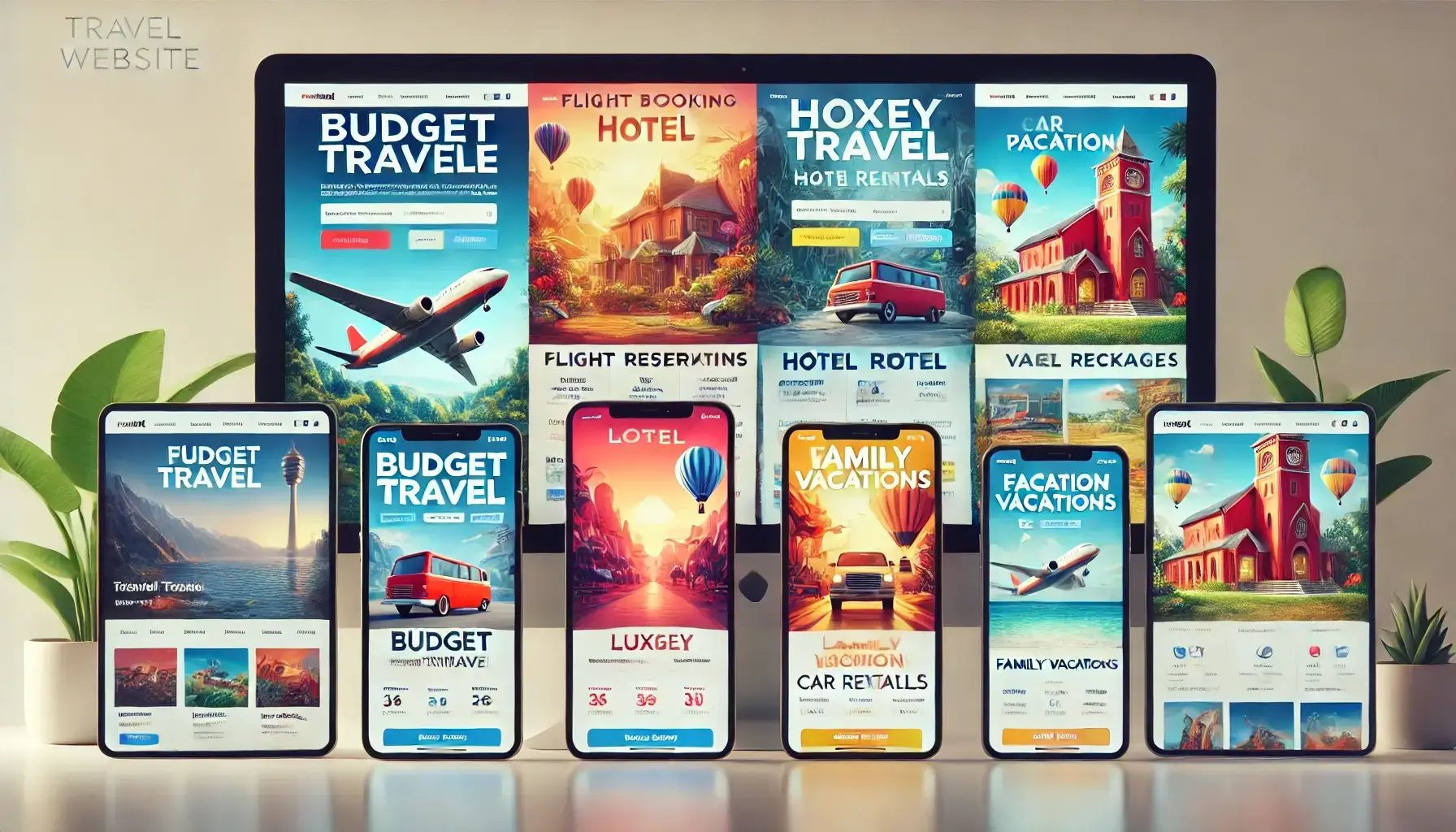
Once you’ve narrowed down your hotel options, it’s time to decide how to book. Most travelers start by using hotel comparison platforms like “Booking.com”, “Expedia”, or “Trivago” to compare prices across various sites. However, before making a final decision, it’s always a good idea to check the “hotel’s official website”. In some cases, the hotel’s site may offer the same room for a lower price or include additional perks that aren’t available on third-party booking sites.
By comparing prices across both methods—third-party aggregators and direct hotel bookings—you can ensure you’re getting the best deal for your stay.
Booking directly through a hotel’s website often comes with “added benefits” that third-party platforms can’t always provide. Some advantages include:
Better rates: Many hotels offer price match guarantees or lower prices when booking directly.
Free perks: You may get complimentary upgrades, free breakfast, or Wi-Fi when booking through the hotel’s official site.
Flexibility: Direct bookings typically offer more flexible cancellation policies or change options, giving you greater peace of mind.
While booking platforms are convenient, it’s worth checking if booking directly can give you an edge in savings or additional amenities.
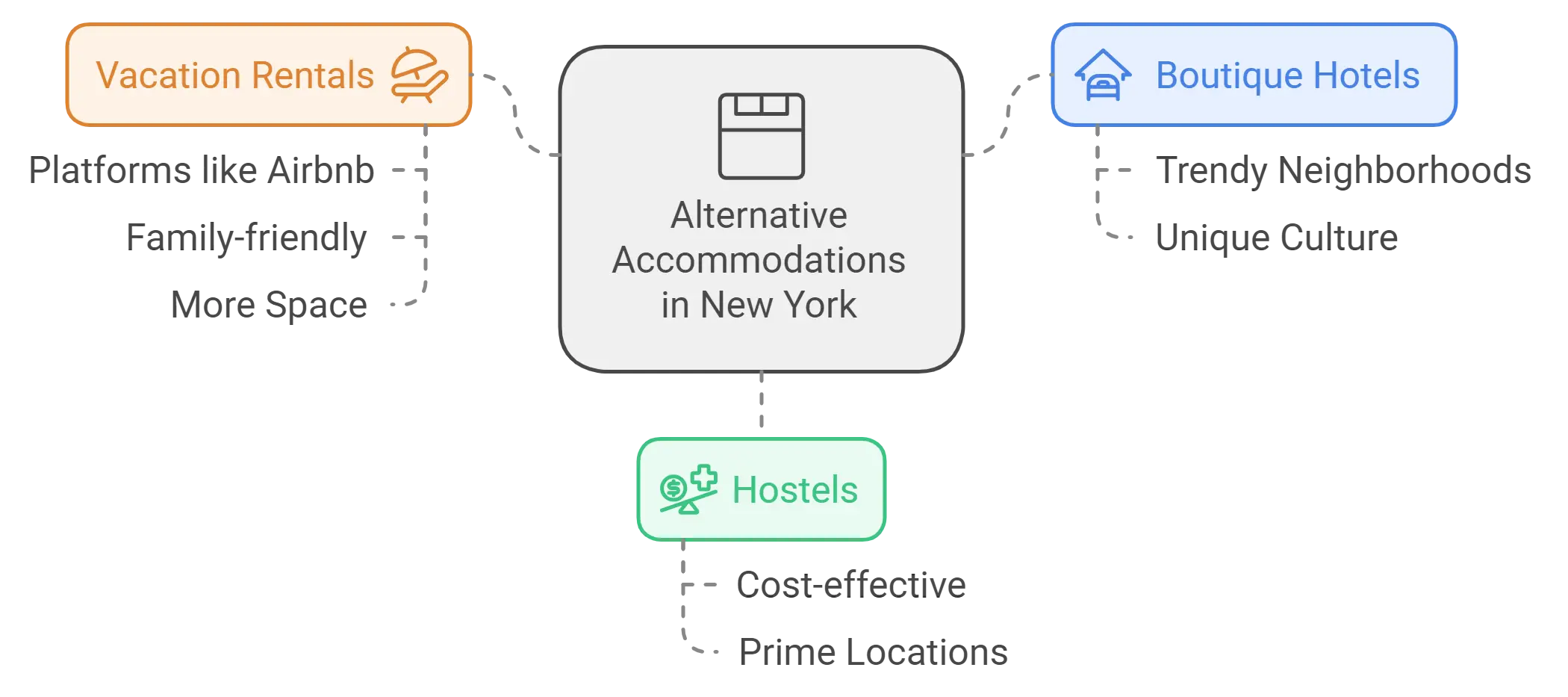
While traditional hotels are a common choice for most travelers, it’s worth considering “alternative accommodations” depending on your needs and preferences. In New York, you’ll find a wide variety of options, including:
Boutique hotels: These offer a more personalized and intimate experience compared to large chain hotels. Many are located in trendy neighborhoods like “SoHo” or “Greenwich Village”, giving you a unique glimpse into New York culture.
Hostels: If you’re traveling on a tight budget, hostels can be a cost-effective solution. While most are basic, they provide an opportunity to meet fellow travelers and are often located in prime city areas.
Vacation rentals: Platforms like “Airbnb” or “Vrbo” allow you to rent apartments or entire homes. This option is great for families, longer stays, or travelers who prefer the comfort of a home setting with more space and kitchen access.
Exploring these alternative accommodations can help you find the best fit for your trip, whether you’re prioritizing budget, location, or a unique experience.

Before clicking the final “confirm” button, take a moment to “double-check” all the details of your reservation to avoid any surprises upon arrival. Make sure the following information is accurate:
Dates: Verify your check-in and check-out dates are correct.
Room type: Ensure you’ve booked the right room category, especially if you’ve selected specific features like a king-size bed or city view.
Cancellation policy: Review the hotel’s cancellation policy to understand your options in case your plans change.
Special requests: If you’ve made any special requests (e.g., early check-in, accessibility needs), confirm that these have been noted in your reservation.
Taking a few extra minutes to review your booking can save you time and hassle later, ensuring your trip to New York starts smoothly.
Booking a hotel in New York may seem daunting, but with proper research and planning, you can secure the perfect accommodation while staying within your budget. By following the steps outlined in this guide—comparing prices, considering your needs, booking early, and exploring alternative accommodations—you’ll be well-prepared for a successful and enjoyable trip.
“Planning ahead” is key to avoiding unexpected costs and ensuring that your stay aligns with your travel goals, whether you’re visiting for business, sightseeing, or relaxation. With the right approach, you’ll not only save money but also have a seamless experience in one of the most exciting cities in the world.
Q1: What is the best time to book a hotel in New York for the lowest rates?
A1: To get the best rates, book your hotel in New York at least 90 days in advance, especially for peak travel seasons such as the holidays or summer. Consider visiting during the low season (January to February) when hotel rates are typically lower.
Q2: What are the best areas to stay in New York for sightseeing?
A2: Manhattan is the ideal area for sightseeing, as it places you close to iconic attractions like Times Square, Central Park, and the Empire State Building. If you’re seeking a more local experience, consider staying in Brooklyn, which offers a laid-back atmosphere with trendy shops and restaurants.
Q3: How can I find the best hotel deals in New York?
A3: Use hotel comparison platforms such as Booking.com, Expedia, or Kayak to compare prices and filter by location, amenities, and guest reviews. Additionally, check for special promotions or package deals and consider booking directly through the hotel’s official website for exclusive offers.
Q4: What amenities should I look for when booking a hotel in New York?
A4: The amenities you prioritize depend on your needs. Common must-haves include free Wi-Fi, breakfast, and a fitness center. For families, look for hotels that offer cribs or kitchenettes, while business travelers might prefer hotels with conference facilities and workspace.
Q5: Are alternative accommodations, like Airbnb, a good option in New York?
A5: Yes, alternative accommodations such as Airbnb or vacation rentals can be a great choice, especially for families or extended stays. They often offer more space and kitchen facilities compared to traditional hotels, and they can provide a more authentic local experience.